|
German teenager Regina Mayer asked her parents for a pony, when they refused Reginadecided the next best thing would be to train Luna, one of her family's cows.
Although reluctant at first Luna now seems quite happy to jump the surprisingly high fences built for her on the family farm. Meyer said: "I still want to get a horse since it's just not the same. But I'll always be with Luna and do things with her. She'll stay my favorite."
0 Comments
It's becoming more popular to use essential oils in livestock massage. The thought itself sounds a bit odd...livestock massage. Therapist are expressing the added soothing effects of using essential oils along with their massage techniques. Turns out... cows love getting massages! Giving regular massages to your cows helps keep the cow in a more relaxed state. This is great for beef cows because the meat is much more tender and it helps reduce birthing difficulty with pregnant cows! We've collected a few blends that are used by livestock massage therapist and have been proven to help relax cattle, from "Essential Oils To Calm Livestock". To make these essential oil blends you will need to put the same number of drops of each essential oil listed - for the blend that you choose, into a empty glass essential oils bottle - which you can get on Amazon. It's important for preserving the quality of the oil that you use either a blue or brown container and not clear. Most Effective Essential Oil Blends You Can Make, |
| Bavarian farmers are pretty upset about having to place nappies on their dairy cows and the Bavarian Farm Union have started to protest against the EU's new law. There are no commercial developed standard "nappies" yet, so farmers are just winging it. Most cows are handling the odd draping material around their rear pretty well. |
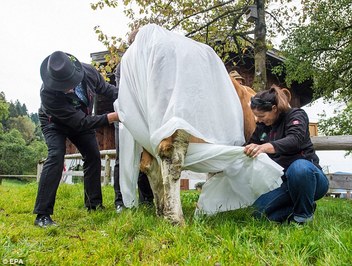
Johann Huber's family has owned their farm on the slopes of Gmund am Tergernese for over 400 years. Their cows have always happily fertilized their slopes. But with this new enactment Huber started placing his own homemade "nappies" on his cows to be on the side of caution.
What do you think of this udder nonsense? Share your two cents in the comments below..
What do you think of this udder nonsense? Share your two cents in the comments below..
The earlier the better is the best method for halter breaking any calf. It's really important for them to get used to you touching them, so begin right at birth. It really helps if you have a cow that will allow you near her as well, because it will be in her nature to let you near her calf. So it is important to select Beefalo that you can work with easily from the start.
Let us know if you have any tricks to halter breaking your calves in the comments below. If you are looking for Beefalo calves as 4-H students or for other show purposes, visit the "Beefalo For Sale" page for a list of current Beefalo calves for sale.
BEEFALO VENTURES
A Cold Winter's Day
By Lucien Hinkle
One fine winter morning, all the cows were standing out in the barnyard. It was cold and windy, but the cows were in the leento off the barn out of the wind, and the sun was shinning brightly. Each cow was standing broad side to the sun, warming herself.
They stood like that for a long time, contentedly soaking up rays and chewing their cud. Then a young cow said to an older one;
“Hey Rosetta, you’re standing in my sun!”
“No I’m not, Madera,” she replied.
“Yes you are.
“Am not.”
“Are too.”
“No I’m not,” Rosetta said. “You’re standing in my shadow.”
The young cow was puzzled for a moment, and then said:
“Well, I was here first!”
“No you weren’t.”
“Yes I was.”
“Was not.”
“Was too!”
“But I’m bigger than you,” said Rosetta
Madera wasn’t sure what size had to do with it, so she stood there thinking about it for a while. Finally she said:
“Then you must have moved, Rosetta.”
“No I didn’t.”
“Yes you did.”
“No, you moved.”
“Did not!”
“Did too! I saw you.”
Madera hung her head sadly. She always lost these arguments with Rosetta. All this time the other cows had been listening quietly.
Just then old Grand Mom spoke; “There can be only one explanation for this,” she said. “I think the sun must have moved."
All cud chewing stopped. The cows stared at one another in disbelief. Suddenly Rosetta exclaimed. “That’s right, Grand Mom, that has to be the answer! You sure are the smartest cow in the herd.”
With that all the cows moved around until they were again soaking up the warmth of the sun, and returned to contentedly chewing their cud.
*These stories are copy righted and all rights reserved. These stories may not be copied or reproduced in any way without the express consent of the author. Lucien Hinkle
Strolling Of The Heifers
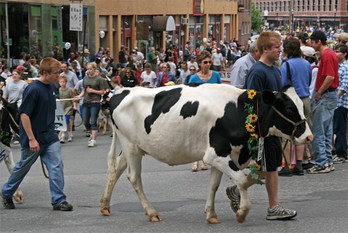
In what is know, known as a town charished tradition. Last weekend; some 100 heifers, colorfully decorated with spring flowers strolled down main street in Brattleboro, VT. About 50,000 people (which) is half of Vermonts population, assembled 3 rows deep to show their support and appreciate for it's local farmers.
Where It All Began..
This age old tradition was first started in 2002 where it took it's inspiration from Spain's "Running of the Bull". Vermonters where lamenting over the growing loss of dairy farmers. It was establish to bring attention to farming’s importance to the community’s health, heritage, and economy.
Where It All Began..
This age old tradition was first started in 2002 where it took it's inspiration from Spain's "Running of the Bull". Vermonters where lamenting over the growing loss of dairy farmers. It was establish to bring attention to farming’s importance to the community’s health, heritage, and economy.
“Without farms, we don’t eat,” says Orly Munzing, the parade’s founder and executive director, adding that “when food became a commodity, people lost touch with where their food came from, even here, where a farm is a stone’s throw away.”
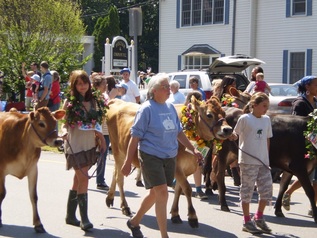
Change, Not Always what We Hope For..
Understandably we expect some change over the years. In the 1940's Vermont proudly boasted over 11,000 dairy farms, you will be shocked to know that number is down to a whoppen 1,000 today. Sadly "Rob Family Farm" who led out this years parade takes that number down by one more. After being in production for 104 years Helen Rob says;
"Shutting down was a hard decision, but the economics of running a small dairy (50 to 55 cows) no longer made sense as the price for milk barely keeps pace with increasing feed, seed, diesel, and fertilizer costs."
Understandably we expect some change over the years. In the 1940's Vermont proudly boasted over 11,000 dairy farms, you will be shocked to know that number is down to a whoppen 1,000 today. Sadly "Rob Family Farm" who led out this years parade takes that number down by one more. After being in production for 104 years Helen Rob says;
"Shutting down was a hard decision, but the economics of running a small dairy (50 to 55 cows) no longer made sense as the price for milk barely keeps pace with increasing feed, seed, diesel, and fertilizer costs."
On a positive note...
There is a rise in demand for small niche farms, particularly artisan cheese markers. And if only for a day the uncertain future of Vermont farms floats away in the shouts of this happy parade.
There is a rise in demand for small niche farms, particularly artisan cheese markers. And if only for a day the uncertain future of Vermont farms floats away in the shouts of this happy parade.
BEEFALO INFORMATIVE ARTICLE
A common denominator found while having volunteered at the recent farm and forest expo, is that once a person decides to raise their own beefalo.. little is known about what to do with them after that. Below is a compilation of these 2 articles:
"Why Buy And Keep Register Cattle" & "Register That Bull".
Many farmers feel it is not important to register their beefalo, making the comment: "If I want papers.. I'll get the Sunday Times". We may chuckle at this, but the sad reality is unfortunately the amount of financial loss and limitations for these farmers for not having "papers" on their beefalo.
Note: We do not raise just any kind of cattle, we raise a unique hybrid with a long and proud history. Being able to distinguish our breed from just any ordinary beef cattle is a privilege, not an obligation. It is my desire that in sharing this article from other cattle farmers, that we can open our minds to the positive aspects of registering our beefalo.
"Why Buy And Keep Register Cattle" & "Register That Bull".
Many farmers feel it is not important to register their beefalo, making the comment: "If I want papers.. I'll get the Sunday Times". We may chuckle at this, but the sad reality is unfortunately the amount of financial loss and limitations for these farmers for not having "papers" on their beefalo.
Note: We do not raise just any kind of cattle, we raise a unique hybrid with a long and proud history. Being able to distinguish our breed from just any ordinary beef cattle is a privilege, not an obligation. It is my desire that in sharing this article from other cattle farmers, that we can open our minds to the positive aspects of registering our beefalo.
To Register Or Not Register
That Is The Question
"I am often frustrated when browsing through facebook, it is apparent how passionate people are about their animals. So it continues to puzzle me why it is that so many people who appear to be passionate cattle breeders do not register nor buy registered animals.
I am such a strong proponent of pedigree cattle with on-going registration of offspring and I fail to comprehend why other passionate breeders do not share this same foundational golden rule. "-Pat White
So the questions lingers in the air.. why should anyone buy registered cattle?
Registration papers signify the genetic makeup of the animal you own or are about to buy. With one simple piece of paper you are able to trace that animals ancestry back at least 3 generations. Now why would this be important?
Well perhaps we should explore for a brief second "what is a breeder?".
The definition of a "breeder" is paramount and Wikipedia describes it as follows: "a breeder is a person or group that practices the vocation of mating carefully selected specimens of the same breed to reproduce specific, consistently replicable qualities and characteristics." So a breeder differs from one who simply "sells" or "keeps" a particular breed.
A beefalo farmer or hobbiest should look at his/her operation as a business and whether the amount they raise is large or small.. everyone should strive to profit from their sales.
"Let's look at a small example to help clarify this aspect; Trying to duplicate a particular animal by pulling the same ancestors out of the similar pedigrees. This is a common practice among breeders within their herd. When we recognize a superior animal out of one cow sired by a particular bull, we may try to reproduce some of that superior creature by repeating the breeding. Sometimes it works.. other times it fails. That is the fun and frustration of breeding livestock, we get to see what we can accomplish and hopefully learn from our mistakes. In your own herd, your memory or careful note taking rekolect such successes or failures. A purchaser of registered animals now has that same map to success when buying new breeding stock.
Without registration papers or without the transfer of registration to the new owner.. that animal is now effectively lost to the gene pool and is now considered no more then a grade or commercial beef cattle. It's lineage is lost, it's history is lost and in most cases it cannot be reestablished."- Pat White
Let's transition back for a moment to the breeding aspect as we grab a tid bit from the "Register Those Bulls" article.
"Genetic knowledge is critical to the future of the beef business. Without trying to upset anyone, bull circles encompass a lot of discussion, which is good. However, generally, if the breeder has done his or her homework, every bull has been registered and the genes that are available are known. Registration numbers are a pathway to the genetic offering through the various breed associations.
Recently, I have been busy assisting producers at bull-buying workshops. These workshops seem to be appreciated as producers develop baseline or benchmark values for production traits of previous bulls utilized in the herd. Too often, the stumbling block is the lack of a registration number, which blocks access to the database that contains the bull’s information.
Do not make the statement: “Well, the bull only will be used on commercial cows, so I do not need the bull registered.” That is wrong, just wrong.
The biggest toe-stubbing problem in the beef industry is the lack of understanding of the value of individual animal identification.
The point today is simple. Even if individual animal identification numbers are not available for all the cattle in the inventory, the registration numbers available throughout the purebred business are critical and the heart of the breed association." -Kris Ringwall
"Breeding registered cattle is highly rewarding both emotionally and financially. But buy registered cattle is not enough to creating the best, you must learn to study these registration papers and develop a feel for what a "A+" cow or bull is, if you want those papers to pay off. You need to develop the best you possibly can and market those genetics in any fashion that you can fathom. It means you breed reliable cattle that does what you expect, what your consumers expect and desire. You build a reputation for honesty, integrity and good cattle all at the same time. You back your word with deeds and make sure you take care of your buyers. Help them learn, help them market, help them become ennamered with registered cattle as you are.
It's not rocket science, but it goes a long way to cementing a relationship between you and your new buyer and a relationship between that new buyer and your association. Make registration your priority and instill that precident in every purchaser of your cattle.
It takes a long time to build a respected reputation that new breeders will turn to as first choice for new purchase options or herd improvements.
So do those registration papers really matter???
The answer is an unequivocal... YES!
Anyone with cattle can market those animals for beef. And any registered cattle can produce beef, but opposite is not true. An unregistered animal is grade/commercial cattle; no matter how gorgeous, no matter the breed, no matter the confirmation or the temperament, and no matter how "pure" they may look it remains the same... beef.
It is why whenever I see a gorgeous breed of cattle, only to find that it has not been registered- I feel a profound sense of disappointment. I find the failure to maintain registration on any unique breed a travesty and a tragedy" -Pat White
I am such a strong proponent of pedigree cattle with on-going registration of offspring and I fail to comprehend why other passionate breeders do not share this same foundational golden rule. "-Pat White
So the questions lingers in the air.. why should anyone buy registered cattle?
Registration papers signify the genetic makeup of the animal you own or are about to buy. With one simple piece of paper you are able to trace that animals ancestry back at least 3 generations. Now why would this be important?
Well perhaps we should explore for a brief second "what is a breeder?".
The definition of a "breeder" is paramount and Wikipedia describes it as follows: "a breeder is a person or group that practices the vocation of mating carefully selected specimens of the same breed to reproduce specific, consistently replicable qualities and characteristics." So a breeder differs from one who simply "sells" or "keeps" a particular breed.
A beefalo farmer or hobbiest should look at his/her operation as a business and whether the amount they raise is large or small.. everyone should strive to profit from their sales.
"Let's look at a small example to help clarify this aspect; Trying to duplicate a particular animal by pulling the same ancestors out of the similar pedigrees. This is a common practice among breeders within their herd. When we recognize a superior animal out of one cow sired by a particular bull, we may try to reproduce some of that superior creature by repeating the breeding. Sometimes it works.. other times it fails. That is the fun and frustration of breeding livestock, we get to see what we can accomplish and hopefully learn from our mistakes. In your own herd, your memory or careful note taking rekolect such successes or failures. A purchaser of registered animals now has that same map to success when buying new breeding stock.
Without registration papers or without the transfer of registration to the new owner.. that animal is now effectively lost to the gene pool and is now considered no more then a grade or commercial beef cattle. It's lineage is lost, it's history is lost and in most cases it cannot be reestablished."- Pat White
Let's transition back for a moment to the breeding aspect as we grab a tid bit from the "Register Those Bulls" article.
"Genetic knowledge is critical to the future of the beef business. Without trying to upset anyone, bull circles encompass a lot of discussion, which is good. However, generally, if the breeder has done his or her homework, every bull has been registered and the genes that are available are known. Registration numbers are a pathway to the genetic offering through the various breed associations.
Recently, I have been busy assisting producers at bull-buying workshops. These workshops seem to be appreciated as producers develop baseline or benchmark values for production traits of previous bulls utilized in the herd. Too often, the stumbling block is the lack of a registration number, which blocks access to the database that contains the bull’s information.
Do not make the statement: “Well, the bull only will be used on commercial cows, so I do not need the bull registered.” That is wrong, just wrong.
The biggest toe-stubbing problem in the beef industry is the lack of understanding of the value of individual animal identification.
The point today is simple. Even if individual animal identification numbers are not available for all the cattle in the inventory, the registration numbers available throughout the purebred business are critical and the heart of the breed association." -Kris Ringwall
"Breeding registered cattle is highly rewarding both emotionally and financially. But buy registered cattle is not enough to creating the best, you must learn to study these registration papers and develop a feel for what a "A+" cow or bull is, if you want those papers to pay off. You need to develop the best you possibly can and market those genetics in any fashion that you can fathom. It means you breed reliable cattle that does what you expect, what your consumers expect and desire. You build a reputation for honesty, integrity and good cattle all at the same time. You back your word with deeds and make sure you take care of your buyers. Help them learn, help them market, help them become ennamered with registered cattle as you are.
It's not rocket science, but it goes a long way to cementing a relationship between you and your new buyer and a relationship between that new buyer and your association. Make registration your priority and instill that precident in every purchaser of your cattle.
It takes a long time to build a respected reputation that new breeders will turn to as first choice for new purchase options or herd improvements.
So do those registration papers really matter???
The answer is an unequivocal... YES!
Anyone with cattle can market those animals for beef. And any registered cattle can produce beef, but opposite is not true. An unregistered animal is grade/commercial cattle; no matter how gorgeous, no matter the breed, no matter the confirmation or the temperament, and no matter how "pure" they may look it remains the same... beef.
It is why whenever I see a gorgeous breed of cattle, only to find that it has not been registered- I feel a profound sense of disappointment. I find the failure to maintain registration on any unique breed a travesty and a tragedy" -Pat White
BEEFALO VENTURES:
KLM Farm:
KLM Farm brought the following 4 Beefalo to Fryeburg Fair this year; KLM Ranger, KLM Black Label, KLM Teaberry, and KLM Cherry Blossom. They had a good showing with KLM Ranger winning Sr. Champion Bull for A.O.B.
KLM Farm wants to congratulate Becky Mullen of Kennebunk, Maine, on her purchase of KLM Flash. She is planning on crossing him with her Chianinas Becky is the granddaughter of Orrin Nest of Nest, Nest and Mullen butcher shop in Kennebunk, Maine
KLM Smokey is out on loan to Walter Wormwood in Wells, Maine to breed his Angus cows. We are looking forward to their next years calves.
We still have a bull calf available for a 4-H'er as a steer project.
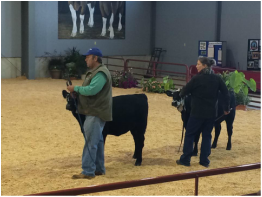
Here you can see Ken w/KLM Cherry Blossom and Me w/ KLM Teaberry

Here I am w/KLM Ranger who was the winning Sr. Champion Bull for A.O.B.

The 3rd picture this was take at Acton Fair Ken and I with KLM Ranger where he was Grand Champion bull, KLM Olive was Champion Female and won a silver plate.
Beryl Mtn View Farm
This has been a full year for us, we started the fall season with a wild rodeo of a herd check. The whole gang of grandchildren, spouses and friends Kelly & Rick helped us roundup each group. We had to play a bit of musical corrals, in order to get everyone in for their shots, dehorning, wormer, tattoos, snips and pregnancy checks. We were grateful no one got hurt (people that is, can’t say much for the once young bulls).
We are also proud to announce that our stud muffins; grand sire “Smokey Quartz” and first year sires - junior bulls “Bart” & “Biki” are doing a great job, we should expect a good bunch of little ones arriving this spring!
“Biki” is enjoying a new entourage of beefalo gals this fall, winter and spring. He is being leased by Tim & Blake Gowen – Tamarack Farm until June of 2016, at which time he will again be up for sale or another lease agreement.
We have added several new registered full-blooded heifers with high bison marker verification to our breeding program this year, we are excited to see the color variation in future offspring that these new girls will bring.
On a fun note...we chuckle to ourselves as we watch their winter coats starting to grow in, returning with them our beefalo’s full headed hairdos.
This has been a full year for us, we started the fall season with a wild rodeo of a herd check. The whole gang of grandchildren, spouses and friends Kelly & Rick helped us roundup each group. We had to play a bit of musical corrals, in order to get everyone in for their shots, dehorning, wormer, tattoos, snips and pregnancy checks. We were grateful no one got hurt (people that is, can’t say much for the once young bulls).
We are also proud to announce that our stud muffins; grand sire “Smokey Quartz” and first year sires - junior bulls “Bart” & “Biki” are doing a great job, we should expect a good bunch of little ones arriving this spring!
“Biki” is enjoying a new entourage of beefalo gals this fall, winter and spring. He is being leased by Tim & Blake Gowen – Tamarack Farm until June of 2016, at which time he will again be up for sale or another lease agreement.
We have added several new registered full-blooded heifers with high bison marker verification to our breeding program this year, we are excited to see the color variation in future offspring that these new girls will bring.
On a fun note...we chuckle to ourselves as we watch their winter coats starting to grow in, returning with them our beefalo’s full headed hairdos.
A GLIMPSE FROM THE PAST:
D&R Beefalo
Fall 1983
Hildegard
Did you ever stop to think how fortunate we small farm beefalo farmers are over large farms and ranches? It’s possible to know all our animals as individuals. They often are not just numbers but will have names, and memorable personalities.
For instance, has anyone ever had a Hildegard? Our Hildegard is the matriarch of our herd. She is the oldest, the largest, and always out front. She doesn’t need to be bossy because she is the boss. A little turn of her head left or right, or a short step forward tells the other beefalo her wishes. She always gets the most and best hay by checking each bale and keeping the best for herself.
When we first got Hildegard we didn’t know she could tell time. We had always run our lives quite leisurely, sleeping late on the weekends and often working on a chore until dusk. She wanted to be fed Hildegard time. Early was OK, but don’t be late! She would just “hop” over the electric fence to munch on the lawn or a cabbage or broccoli plant. She would go right back when the hay was served. It was her way of putting us on her schedule.
Hildegard doesn’t like to be touched or fused with. Strangers upset her. Imagine her anxiety when it was her turn to go through the chute at roundup time in the fall. The corral is six feet high, the gate five and a half feet. Hildegard cleared the top of the gate. It was quite a sight to see a huge animal like her jump that high. We just figured that was it for her fall work that year. But she has a weakness for grain, and knew there was a pail of grain in the chute. Back into the corral she went, down the chute for her share of grain, and then was caught to get her shots and a pregnancy check too. Dr. Leahy the veterinarian had the most amazed look on his face.
Written By:
Olga Bell
Fall 1983
Hildegard
Did you ever stop to think how fortunate we small farm beefalo farmers are over large farms and ranches? It’s possible to know all our animals as individuals. They often are not just numbers but will have names, and memorable personalities.
For instance, has anyone ever had a Hildegard? Our Hildegard is the matriarch of our herd. She is the oldest, the largest, and always out front. She doesn’t need to be bossy because she is the boss. A little turn of her head left or right, or a short step forward tells the other beefalo her wishes. She always gets the most and best hay by checking each bale and keeping the best for herself.
When we first got Hildegard we didn’t know she could tell time. We had always run our lives quite leisurely, sleeping late on the weekends and often working on a chore until dusk. She wanted to be fed Hildegard time. Early was OK, but don’t be late! She would just “hop” over the electric fence to munch on the lawn or a cabbage or broccoli plant. She would go right back when the hay was served. It was her way of putting us on her schedule.
Hildegard doesn’t like to be touched or fused with. Strangers upset her. Imagine her anxiety when it was her turn to go through the chute at roundup time in the fall. The corral is six feet high, the gate five and a half feet. Hildegard cleared the top of the gate. It was quite a sight to see a huge animal like her jump that high. We just figured that was it for her fall work that year. But she has a weakness for grain, and knew there was a pail of grain in the chute. Back into the corral she went, down the chute for her share of grain, and then was caught to get her shots and a pregnancy check too. Dr. Leahy the veterinarian had the most amazed look on his face.
Written By:
Olga Bell
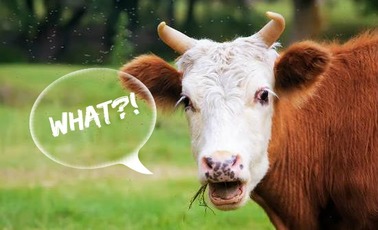
Have you heard the news?
For the first time ever, North Eastern Beefalo Association is going to have their own booth at the NH Farm & Forest Expo!
For the first time ever, North Eastern Beefalo Association is going to have their own booth at the NH Farm & Forest Expo!
The North Eastern Beefalo Association is proud to announce that they will be hosting their very first booth at the NH Farm & Forest 33rd Annual Expo. The NH Farm & Forest Expo is said to be winter's greatest fair and is held on January 22nd & 23rd. Their will be fun things for the whole family to enjoy, so why not make a day of it!
Expo details:
Friday, January 22 9 a.m. to 8 p.m.
Saturday, January 23 9:30 a.m. to 4:30 p.m.
Radisson Hotel
700 Elm Street
Manchester, NH
Expo details:
Friday, January 22 9 a.m. to 8 p.m.
Saturday, January 23 9:30 a.m. to 4:30 p.m.
Radisson Hotel
700 Elm Street
Manchester, NH
"We are excited to be spreading beefalo awareness in hopes to encourage other local farmers to start raising beefalo." - North Eastern Beefalo Association Member
The booth will have posters and pamphlets about the benefits of raising Beefalo and how to start a herd. As well as sample registration forms from the American Beefalo Association, business cards, photos and farm credits. Stop by the booth to talk face to face with a few of New England's Beefalo farmers!
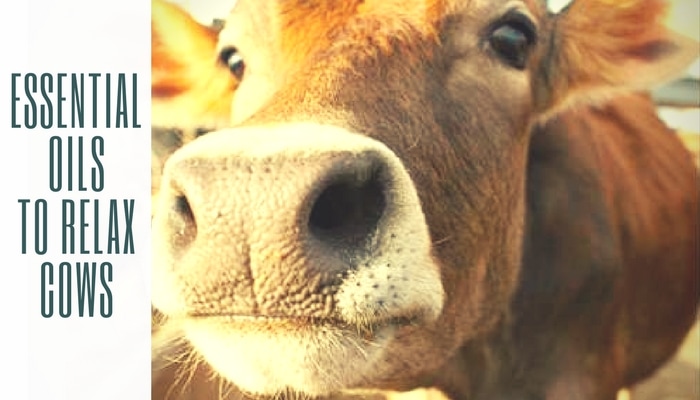

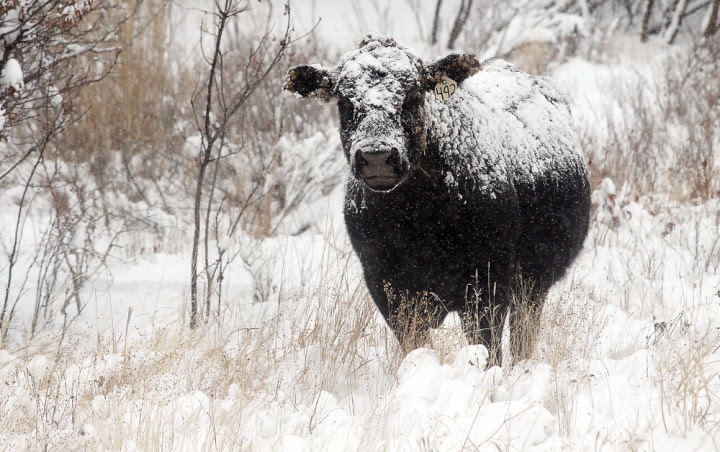
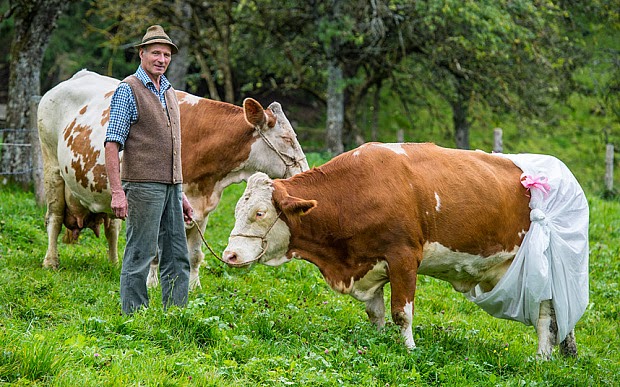
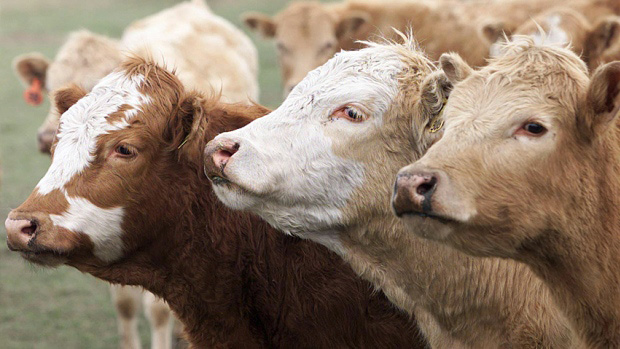
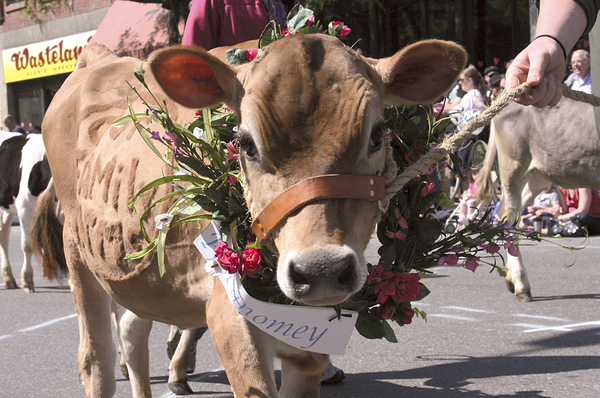
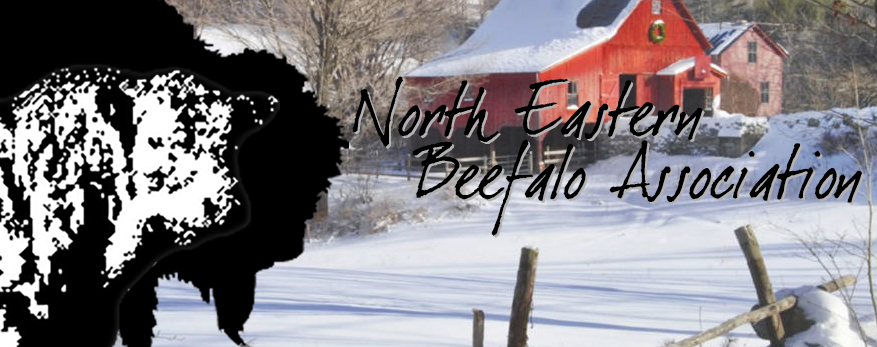
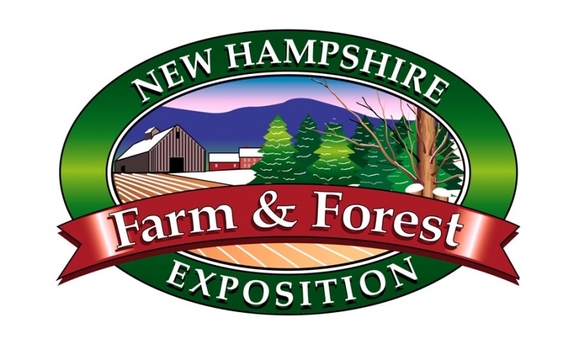
 RSS Feed
RSS Feed
